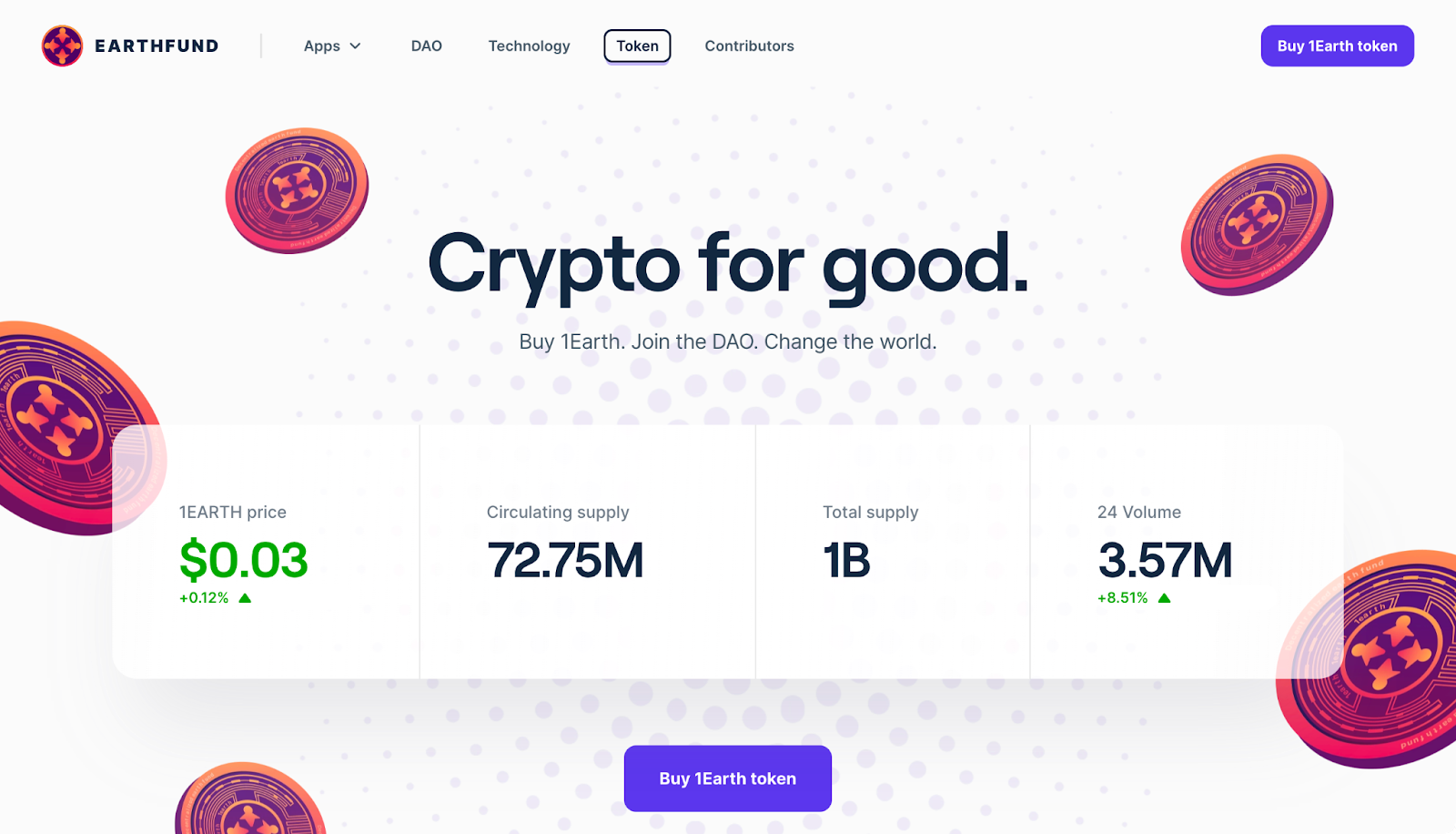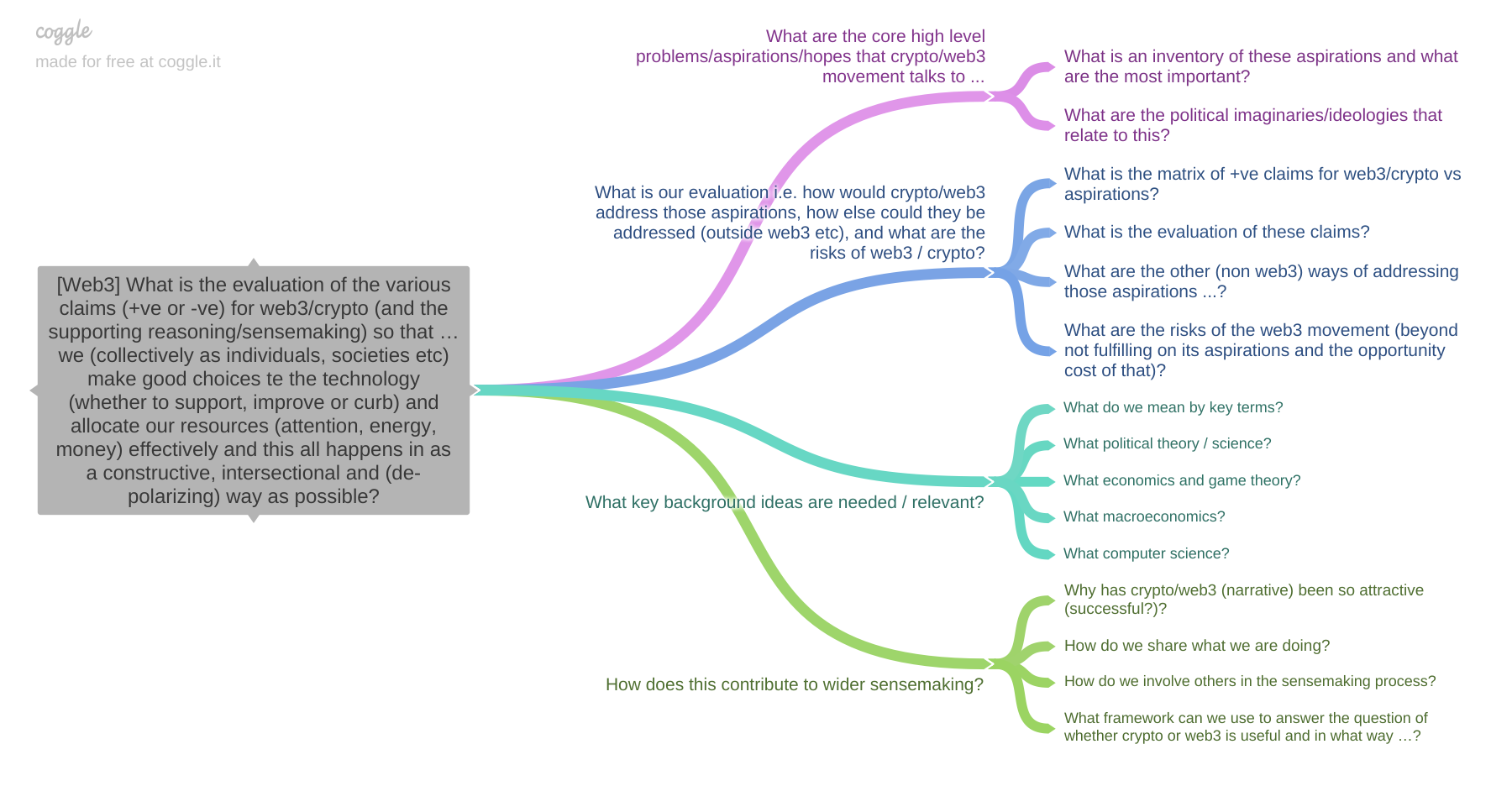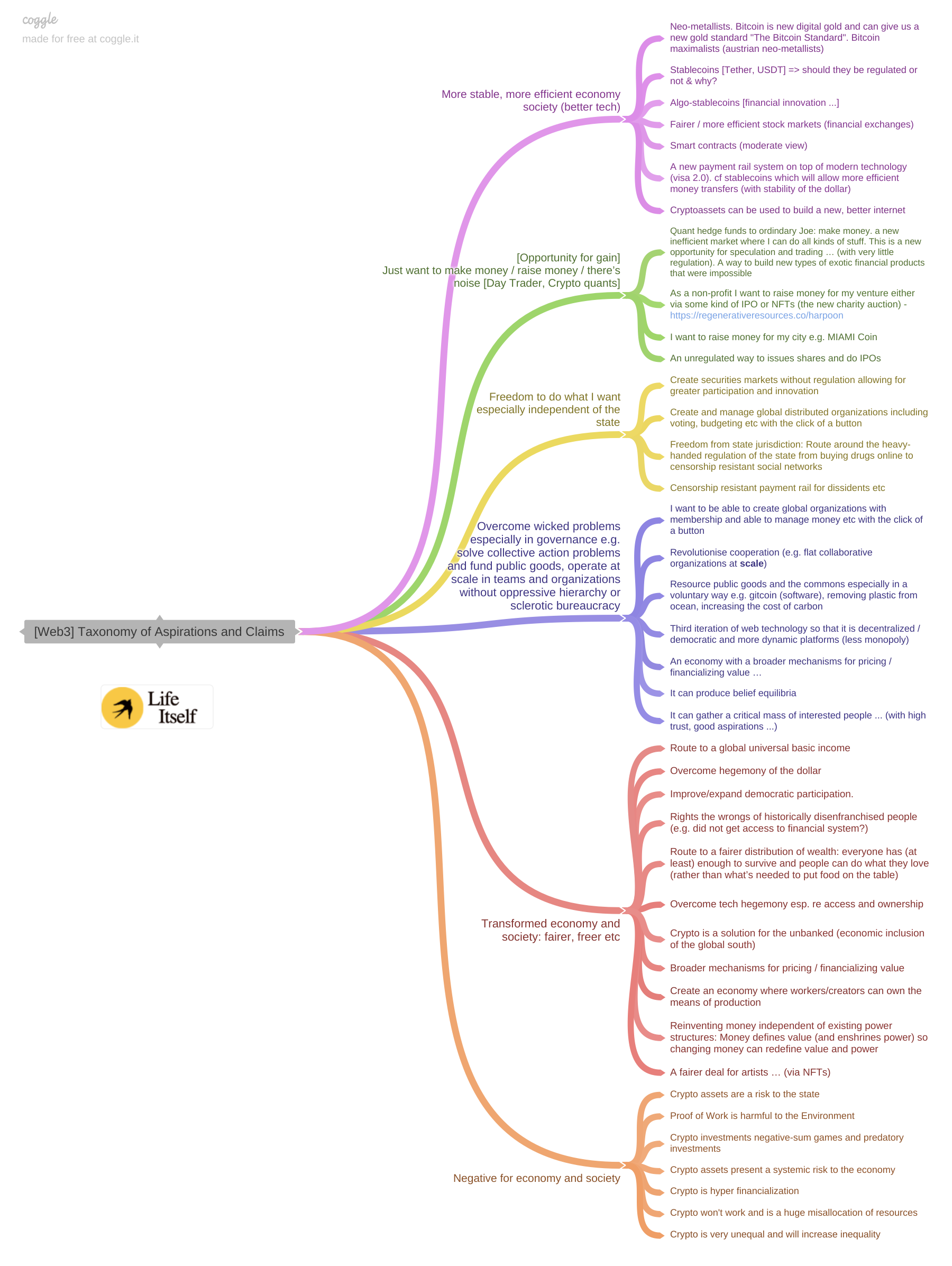Making Sense of Web3
The politics and economics of DAOs, crypto and blockchain
A project of Life Itself Labs & friends
Web3 is a huge phenomenon but it can be hard to make sense of. We're launching this collaborative initiative to address this. Our focus is on the economic and political aspects rather than the technical details.
We will be steel-manning the key claims made by proponents of web3 through conscious, critical and open-minded dialog with a diverse set of experts. Then teasing out the underlying hypotheses and assumptions and engaging in rigorous and constructive critique. Finally, we look at the overall aspirations of the web3 movement and examine how these might be achieved, whether through improvements to blockchain based approaches or by other means.
Why "Making Sense of Web3 (& Crypto)"
Big, controversial and making sense is hard
Web3 & crypto has become a massive phenomenon with very big claims made about its actual and potential impact. Claims that go far beyond traditional technology boosterism (better, faster) to claims for radical transformation (and improvement) of our economic and social systems – for example, web3 is revolutionary for X where X is everything from money and the economy to governance to funding public goods like (open) software, carbon removal etc.
Controversial and polarizing: At the same time, there is an exceptional level of disagreement about these claims, even on basic points or definitions. The topic is highly controversial and even polarizing, with strong pro and anti camps. For example, within tech it is one of the most controversial topics we have ever seen and, significantly, disagreement cuts across classic ideological lines -- there are pro/anti libertarian as well as pro/anti socialists.
Evaluation and sensemaking are hard: Finally, and relatedly, this topic exists at the confluence of several major areas of thought: computer science, economics, political economy, law. These topics are a) complex b) largely synthetic not analytic. As a result, few people have enough time and/or expertise to really delve into them sufficiently, especially those who would normally play a major role in our collective sensemaking such as journalists. In short, this is a topic that is difficult to grok/analyse and do collective sensemaking for.
The Problem: the stakes are high, making sense matters and we're struggling
The stakes are high and sensemaking matters: The stakes are high: claims for the impact of web3 are very large – on both positive and negative sides. Making sense of this topic is therefore important: if we can't make sense of it how can we choose what to do? Moreover, as a topic with societal and global implications it requires societal and global action (e.g. regulation). This means we want not only individual sensemaking but collective sensemaking and agreement.
We are struggling to make sense, especially together: However, this is an area where sensemaking is struggling, even on basic issues. Moreover, it is hard in general here because the phenomenon touches on multiple, complex and “synthetic” areas such as politics and economics. And collective sensemaking is clearly struggling as evidenced by the level of disagreement and controversy in the area.
This risks polarization resulting in stasis and further degradation of our sensemaking capacities: Without good sensemaking we risk polarization: bifurcation in two schools of thought that are incommensurate and culture-war-like; and consequently we risk stasis and sclerosis. This is is bad wherever you stand in the debate: it blocks either necessary support or adequate prevention. In general, polarization chills discourse further impeding our capacities to make sense of this topic, especially together.
A lot of energy and attention are going into this area: There is also a lot of energy and attention being channeled into this area across the spectrum from tech to change-makers. This is energy that could be used elsewhere—it has an opportunity cost. If web3 can’t deliver on its promise this would be a significant waste of energy. Furthermore, given some of the elevated claims, there is a risk that disappointments here would not only tarnish web3 but reduce the energy for other types of innovation or change-making. Whilst there are opportunity costs to any action, they are particularly important in the context of web3 precisely because so much energy and good-will are being channelled here.
This is a runaway phenomenon presenting special risks and requiring special attention: Finally, this is a "runaway phenomenon" with exponential growth in interest, use and investment. To take just one illustrative example, blockchain based assets are the fastest growing asset class we have ever seen in human history; The crypto market cap—the value of all the cryptocurrency tokens in circulation—is currently sitting at $2.6 trillion, according to CoinMarketCap data. This huge velocity of expansion means web3 has the potential to significantly impact the organization of society -- for good or ill. It also renders the risks of wasted resources and energy even greater, as our "spend" is increasing so rapidly. Furthermore, runaway phenomena present special risks because things can happen before we notice and have time to react (cf. AI, climate change, nuclear weapons). The need for discourse and understanding, in other words, is not one that can wait.
We need better sensemaking. How do we get there?
The aim is that we make good choices regarding web3 and crypto individually and collectively. Be that to support, improve or curb it. More broadly, in terms of allocating our resources in the form of attention, energy, money.
Finally, this should happen in as constructive, intersectional and (de-polarizing) way as possible.
We think good sensemaking begins by clarifying and agreeing the questions we want to ask -- and, a process for answering them. Here are our starting questions:
- What are the narratives and claims made for web3, both positive and negative?
- Based on the theory and evidence at our disposal, how should we evaluate these claims?
- Given our evaluations, what should we do? Should we support and/or improve web3 technology, or, alternatively, restrict it? How does this differ across different uses (e.g. DAOs vs NFTs)? How should we do this?
- More generally, what options are there both in web3 and beyond to fulfil on the aspirations voiced for it? And thus, how should we direct our attention, time and money most effectively to realize these aspirations whether via web3 or other means?
And here is our full structured tree of questions:
Our Approach
We intend to take a distinctive approach. It has three key, layered components:
- Distinguishing the key claims and the associated underlying aspirations
- Transparently structuring those claims into hypothesis trees and evaluate them
- A “conceptual underlay” with definitions and introductions to key terms and ideas
First, we distinguish the key claims being made and the underlying aspiration behind them. For example, “blockchain allows for easier collaborative decision making” connects to an aspiration of more democratic governance. This brings clarity to the discussion: claims are atomic, well-defined and separate but connected to aspirations.
Second, we transparently structure and steel-man the claims. In particular, using hypothesis trees we can break down a larger claim into sub-claims. For example, “blockchain allows for easier collaborative decision making” could break down into the claims: “a major problem for collaborative decision making is creating and tracking votes, especially at scale” and “blockchain makes it easier to create and track votes”. We combine this structured approach with the principle of generosity or steel-manning: creating the best version of any claim or thesis.
Teasing apart the different aspects of an overall claim in this manner helps in two ways. First, it makes them easier to evaluate. Second, it makes transparent the reasoning behind any evaluation (including differing evaluations – for example, if I disagree with the overall claim we can now see whether it is because I disagree with subclaim one or subclaim two).
Third, we provide a high quality “conceptual underlay” with definitions and introductions to key terms and ideas ranging from things like blockchain itself to public goods and the free rider problem. This conceptual underlay serves two purposes.
First, it provides a basic introduction for those coming to the topic with simple, neutral summaries of the key ideas and terms. Second, it provides a base “layer” that underpins the evaluative work and the overall sensemaking effort. For example, suppose you want to evaluate the claim that DAOs can help address the climate crisis. To do that you are going to need contextual material about public goods, free rider problems – as well as information on what a DAO is! In addition, this is an area where meanings of key terms are crucial and often ill-defined for example what exactly do we mean by “collaboration” or “freedom” (and is our meaning shared)? By providing reference material and common definitions we can ground and inform the debate and avoid “talking past each other”.

Finally, this reference layer is useful beyond claim evaluation. One of the exciting things about crypto and web3 is it engages with old, profound social and political questions such as the nature of money or the best form of government. However, in the excitement of novelty there can be a lack of awareness of existing literatures and historical precedents – which risks reinventing the wheel or, worse, repeating old mistakes. A solid conceptual background can help reduces these risks and improve the overall quality of discussion.
Ultimately, our approach is guided by the aspirations of the web3 movement. We tease out the different strands of the web3 discourse and examine them in their own right. We support the pursuit of these aspirations, showing where web3 efforts need to be improved and presenting alternatives where appropriate. By structuring and presenting our enquiry in this way we can make the large volume of web3 content less overwhelming, and easier to grasp.
Get Involved
This is a collective effort and we're keen to involve collaborators and contributors. We already have a range of expert partners and contributors and we'd love to have more! Here are some ways of how you can get involved:
- Contribute to the library, for example by adding articles and research on web3 and background topics.
- Write up key concepts and ideas.
- Proof edit articles and transcribe dialogs.
- Share the work with others
We'd also love to have feedback through our forum
- Are there particular topics or areas you think we should cover?
- Do you disagree with any of our assessments? Have we missed or misunderstood something?
- Do you have feedback on how we structure or present the thinking?

